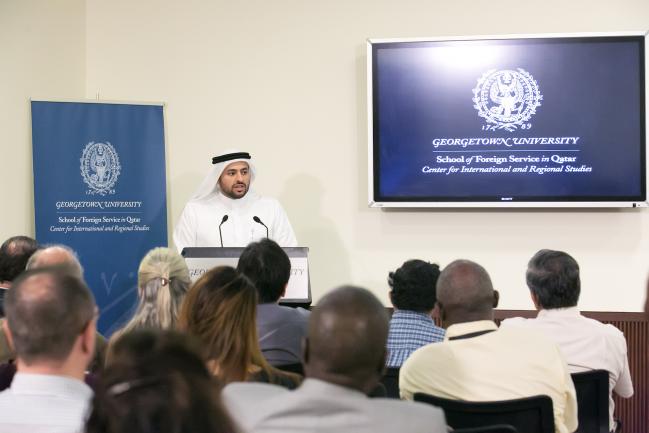Dialogue Series, Regional Studies
Insights into the Qatari Legal System

Mohammed Abdulaziz Al-Khulaifi, Associate Dean of Academic Affairs and Assistant Professor of Commercial Law at Qatar University and the 2013-2014 CIRS-Qatar University Fellow, delivered the final CIRSMonthly Dialogue lecture of the 2013-2014 academic year on May 12, 2014. The topic of discussion was “Insights into the Qatari Legal System,” wherein Al-Khulaifi gave an overview of Qatari regulations, the judicial and legislative sectors, and the relationship between legislation and developments in Qatar. Current Qatari legislations are divided into two main categories. The first is public law, which involves the public authority such as international law, constitutional law, and criminal law. The second is private law, which includes civil and commercial laws.
Al-Khulaifi gave some background to Qatari legal history by noting that, since the 7th century, early Qatari society referred to custom and Shari‘ah when solving disputes, which were used extensively in cases put forth by pearl divers of the time. Despite the Gulf countries’ subscription to the British mandate in the modern period, Shari‘ah law remained as the prevailing law for citizens. Since Qatari society has always been regulated by a traditional form of social governance, “it would be majorly incorrect to say that the history of law in Qatar started with the issuance of the official gazette in 1960,” he explained. With Qatari independence in 1971, there was an overhaul of the legal system wherein “British courts were eliminated and replaced by the ‘Qatari justice courts,’” which presides over civil, commercial, and criminal law, while the Shari‘ah court presides over family and inheritance issues.
Since the establishment of the hydrocarbon industry in Qatar, the country’s legal system went through a significant transformation to pave the way for foreign corporate and economic interests and investments. This has been achieved by adopting laws that ease the legal process for doing business, and by aligning with many of the international norms, he noted. Currently, “Qatar is engaged in a tremendous number of high-value projects,” as “the country is involved with approximately US$250 billion worth of projects related to the preparation of the FIFA World Cup 2022,” he added.
Describing the legal process itself, Al-Khulaifi explained that, in order for one of the ministries to propose issuing a law, it is first prepared as a “draft” created by specialized legal committees in the Council of Ministers, which is then presented to the Shura Council for consideration. Upon acceptance, the Shura Council returns the “draft” to the Council of Ministers to be crafted into its final form and then to be issued by the Office of His Highness the Emir. Once it is signed by His Highness the Emir, it is sent to the Ministry of Justice for publication in the official Gazette of the State for application in public life. “It is also quite crucial to emphasize that the Qatar legislations are mostly similar in content to the legislations in the Gulf region and the Arab World,” he continued.
In conclusion, Al-Khulaifi noted that Qatar was ranked 14th in the 2011-2012 Global Competitiveness Ranking. Since there is such growth in the commercial and business sectors in Qatar, which are continually expanding, there should also be vigilance regarding the application of the law, and dealing with any necessary revision as needed. “This fact should continuously notify the legislator and lawmakers in the country to cope with the ultimate development in the different fields of law by reviewing the existing laws and providing new reliable regulations that would legally protect […] development in Qatar,” he concluded.Article by Suzi Mirgani, Manager and Editor for CIRS Publications.Mohammed Abdulaziz Al-Khulaifi graduated from Qatar University with a Bachelor degree in Law (LL.B) in 2007 and received his Master of Laws (LL.M) and Judicial Science Doctorate (J.S.D) degrees from University of California, Berkeley in 2011. Al-Khulaifi received the State Ph.D. award from H.H. Sheikh Tamim Bin Hamad Al Thani, the Qatari Emir, at Qatar Education Excellence Day in 2012. Besides his academic work, Al-Khulaifi is an authorized Qatari attorney at Abdulaziz Saleh Al-Khulaifi’s law office in Doha. In addition, he has been consulted by governmental institutions to present his legal opinions on matters related to commercial legislations in the state of Qatar.